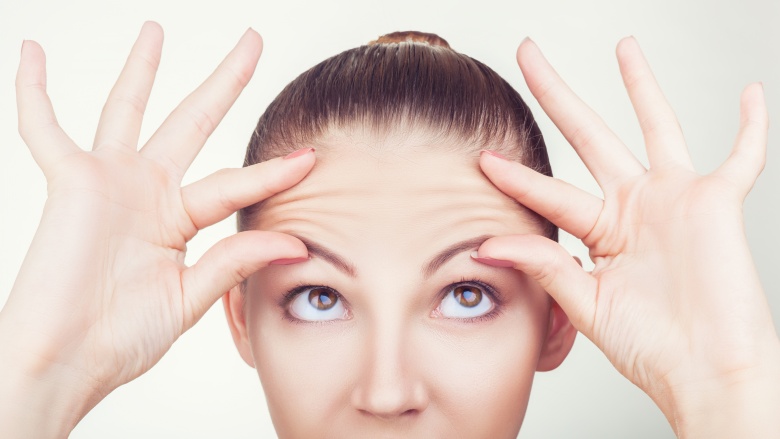What Your Skin Says About Your Health
Our skin is pretty amazing. As the largest organ in your body, it protects against infection, regulates body temperature, and warns us of danger. When you accidentally touch your hot curling iron, it's your skin that warns your brain of the burn. Skin provides a barrier to keep harmful bacteria out. It's also pretty important to our appearance.
Healthy skin gives us that glowing, youthful look. So when we start to notice wrinkles and discoloration, we may blame it on aging, but it could be more than that. Skin also gives us clues as to what is going on inside. From redness to itching, skin changes may signal a change in internal health. Many health conditions start with skin changes, so be on the lookout for even small things. It could save you time at the doctor later on!
Allergies
Our skin protects us from threats. Hives and itchy skin often mean we have an allergy to something in our environment. Hives are raised, blotchy, red areas all over the body. Hives can be caused by anything we're allergic to, like medication, food, pets, insect stings, or pollen from flowers.
So if you've discovered that you break out every time you are around cats, ask your cat-loving friend to meet you out rather than going to her place. Hives can pop up right away or even hours after seeing the little furballs, so try to avoid getting too close.
Thyroid disease
You know your friend who looks like she's hit the tanning bed too hard? Well, her orange hue might actually be from low thyroid. Beta-carotene, an antioxidant found in orange produce like carrots and sweet potatoes, is processed in the thyroid. So when the thyroid isn't working, beta-carotene builds up in the blood, causing the skin to take on an orange color.
Skin health also includes hair and nail health. Some women with low thyroid start to notice brittle hair and nails, as well as dull skin. Low thyroid also causes fatigue and intolerance to heat and cold. Don't worry, these symptoms should all go away as soon as it's treated.
Women with overactive thyroid may be noticing more hair in the shower drain. Dry, brittle hair can be a sign of low or overactive thyroid.
Diabetes
One of the first signs of signs of diabetes is from the skin. People with diabetes have uncontrolled blood sugar levels. These levels lead to changes in the skin. The blood vessels in the skin change, and lead to thick, shiny areas on the skin called "plaques."
People with advanced diabetes will notice a decreased sensation in their skin, because of decreased circulation. So if you're walking barefoot on the beach, you may not even notice that you cut your foot on a rock. If your diabetes is advanced, it's always a good idea to regularly check your skin.
Celiac disease
It probably feels like all your friends are going gluten-free these days. Maybe you've even thought about it. Well, if you've been scratching your skin off from a red and seriously-itchy rash, maybe you should take a stroll down the gluten-free aisle at Whole Foods.
This burning rash of tiny blisters is called called dermatitis herpetiformis and occurs in people with celiac disease. Those who get the rash often don't experience the digestive problems we think of with a gluten intolerance. If you suspect you have this, see your doctor. Actually, you probably already have because of the insane burning.
Anemia
If you notice that you're starting to look like a member of the Addams Family, low iron may be to blame for your new pasty complexion. Anemia causes low iron levels in the blood and causes the face and hands to lose color. Iron-rich foods like red meat, dark green vegetables, and eggs can help increase iron levels, as well as a supplement. Your doctor or nutritionist will be able to give you the best plan for your body.
Too much salt
Those bags under your eyes may not be from last night's work happy hour. People who notice eye puffiness and dark circles around the clock may be getting too much salt in their diets. High-sodium foods cause our bodies to retain fluid, and our sensitive under-eye skin shows it.
Low bone density
Think those wrinkles are just from aging? A study of postmenopausal women discovered that those with deep wrinkles in their faces and necks were more likely to have low bone density. It's the collagen in our skin that keeps it bouncing back and looking fresh, so when it's missing from the skin, it could also be missing from the bones. Check with your doctor to be sure. Exercise, calcium and other medications can also help keep bones strong.
Skin cancer
Moles could be harmless dots or a sign of skin cancer. If you notice that a mole has changed recently, check with your dermatologist. It's also a great idea to regularly check your own skin. Look for moles that are asymmetrical (not even), have uneven borders, are larger than a quarter inch, or have been changing.
Psoriasis
People with psoriasis experience a dry, itchy rash all over their body, but the nails could actually be a clue, too. Pitted nails, nails that are deformed or turning a yellowish brown color, could signal psoriasis or even psoriatic arthritis. So if your manicurist makes a face every time she sees your hands, it may be time to get it checked out.
Lupus
Lupus is a chronic immune-system disorder and affects the skin, as well as blood and the kidneys. One common sign is called the butterfly rash. This rash appears on the face and covers the cheeks in a butterfly shape. If you notice this type of rash and have been feeling run-down, be sure to ask your doctor.
Polycystic ovary syndrome
If you've been needing to visit the salon for a wax more often than normal, there may be something more going on. Some new facial hair is never welcome, but it could be more than just an annoyance. Women experiencing new-onset facial hair and cystic acne should see their doctor, as this could be sign of polycystic ovary syndrome (PCOS). PCOS is a hormone imbalance and about 70 percent of women with the condition report new hair growth, usually on the face and chest.
In addition to the skin symptoms, PCOS causes irregular periods and even infertility, so it's best to get it checked out right away.
Liver disease
A new or chronic rash could have a million causes. One that not many people think of right away is liver health. People with liver diseases, such as cirrhosis and hepatitis, often report itching skin. Hepatitis C causes red, itchy bumps on your legs. Most liver diseases also cause yellowing of the eyes.
Now next time you feel an itch, don't assume you have a chronic liver condition! More likely causes of itching are common things like allergies, asthma, and eczema.
Something more
The skin can even give us clues into our emotional and psychological health. We've all seen how our skin can show our emotions. Whether you turn bright red during a big presentation at work or you break out after a breakup, the skin is affected.
Researchers at Harvard have studied the relationship between skin and emotions and found that mind-body techniques may help chronic skin conditions. So if no cream is helping your itching rash, try meditating.














